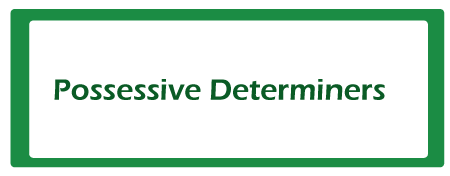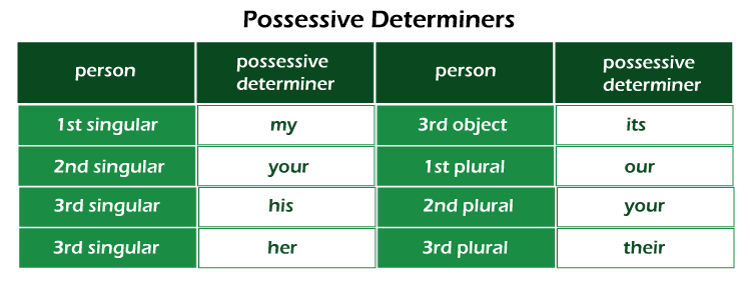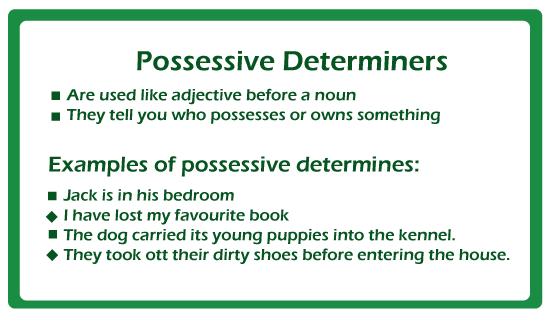Possessive DeterminersPossessive determiners are those that convey possession. Although these do not have the same syntactic allocation as true adjectives, they are referred to as possessive adjectives in some conventional English grammar. 
In English, instances comprise of possessive varieties of personal pronoun such as my, your, his, her, its, our, and their. However, it excludes forms like mine, yours, ours, and theirs which are utilized as possessive pronouns but not as determiners. Possessive determiners might include possessive forms derived from nouns, other pronouns, and noun phrases, such as George's, the lady's, somebody's, and the monarch of Europe's, when used to alter a subsequent noun. Various linguistics require possessive determiners to conform with the word they alter. For instance in French language terms like mon, ma, mes, which are the masculine, feminine, singular, and plural are variants of the English term my.
Using Possessive DeterminersSentence structurePossessive determiners are typically used before the noun they change. As an example:
If the noun is changed further by one or more other determiners, the possessive determiner comes first. As an example:
(*Usage Note: It is usual to use an apostrophe with the term it to signify possession. It's a contraction used rather than writing it is, or it has. To indicate possession, it is ideal to use its without an apostrophe.)WhoseWhose is a possessive determiner utilized in interrogative phrases to inquire about possession and indirect queries when the owner's identification is unclear. For instance For instance
(*Usage Note: Similarly, to the issue with the term its, when we want to query about possession, we often use who's instead of whose. Who's is a abbreviated form of who is; to indicate possession, it is suggested to use the possessive determiner whose.
The Possessive ApostropheBy adding the possessive apostrophe + "s" to additional pronoun, noun, and a noun phrase, we can create possessive determiners (or just the apostrophe for plural nouns). For instance,
Distinctions Between Possessive Pronouns And Possessive DeterminersPossessive determiners and possessive pronouns are frequently mistaken. Most common pronouns are mine, yours, his, hers, its, ours, theirs. However certain varieties overlap, there are significant differences amongst the two types of possessives. Possessive pronouns can stand alone and replace a noun, while possessive determiners cannot. As an example:
The second instance is erroneous since possessive determiners like my can change but not replace a word. To utilize the possessive determiner, we must also include the noun novel, like in:
However, possessive determiners produced with "-'s" can serve as both determiners and pronouns, as in:
or "It's Sheena's," says Mary. (correct) 
Another contrast is that while the structure + possessive pronoun can be used to construct a possessive sentence, a possessive determiner provides the noun with a more specific meaning. Consider the following sentences:
The first example suggests that either the person speaking is unsure which buddy will arrive or that the audience has never met the buddy. Whereas on the contrary, the second instance employs the possessive determiner my to explicitly change the noun buddy, giving the message that the person speaking has a specific buddy in mind. Also, it may imply that the listening person is well aware of this person. Most common mistakes
Next TopicDemonstrative Determiners
|
 For Videos Join Our Youtube Channel: Join Now
For Videos Join Our Youtube Channel: Join Now
Feedback
- Send your Feedback to [email protected]
Help Others, Please Share









